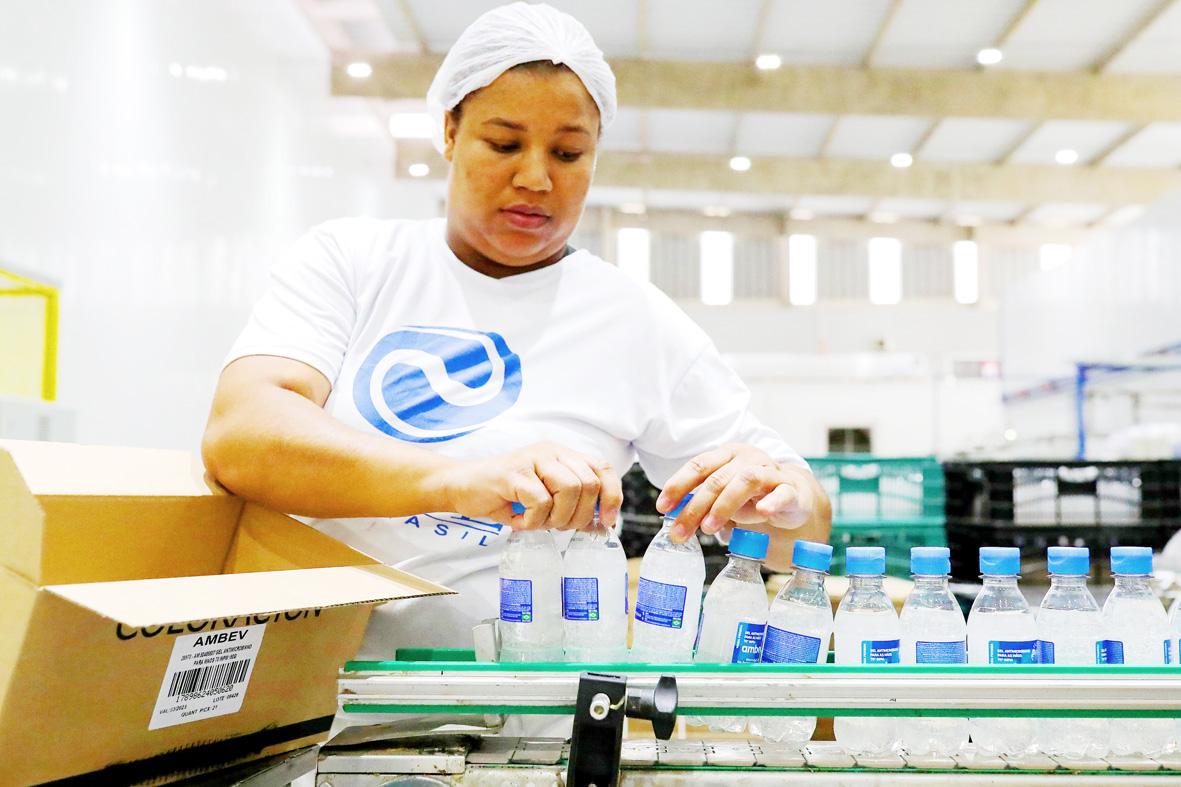Brazil’s governors on Wednesday rebelled against Brazilian President Jair Bolsonaro’s call for life to return to precoronavirus normalcy, saying that his proposal to reopen schools and businesses runs counter to recommendations from health experts and endangers the population.
State governors, many of whom have adopted strict measures to limit gatherings in their regions, defied the president’s instructions in a nationwide address on Tuesday evening that they lift the restrictions and limit isolation only to elderly people and those with longstanding health problems.
The governors were not the only defiant ones: Virus plans challenged by Bolsonaro were upheld by the Brazilian Supreme Court; the heads of both congressional houses criticized his televised speech; companies donated supplies to state anti-virus efforts; and even some of his staunch supporters joined his detractors.

Photo: Reuters
Footage of a private videoconference on Wednesday between Bolsonaro and governors from Brazil’s southeast region showed Sao Paulo Governor Joao Doria threatening to sue the federal government if it attempted to interfere with his efforts to combat the virus.
“We are here, the four governors of the southeast region, in respect for Brazil and Brazilians, and in respect for dialogue and understanding,” said Doria, who supported Bolsonaro’s 2018 presidential bid. “You are the president and you have to set the example. You have to be the representative to command, guide and lead this country, not divide it.”
Bolsonaro responded by accusing Doria of riding his coattails to the governorship, then turning his back on the president.
“If you don’t get in the way, Brazil will take off and emerge from the crisis. Stop campaigning,” Bolsonaro said.
The president has said that a shutdown of activity would deeply wound the country’s already beleaguered economy and spark social unrest worse than the effects of addressing the virus with only limited isolation measures.
He told reporters in Brasilia that he has listened to US President Donald Trump, and found their perspectives to be rather similar.
“What needs to be done? Put the people to work. Preserve the elderly, preserve those who have health problems, but nothing more than that,” Bolsonaro said. “If we cower, opt for the easy discourse, everyone stays home, it will be chaos. No one will produce anything, there will be unemployment, refrigerators will go empty, no one will be able to pay bills.”
He has found some support among his base — #BolsonaroIsRight was trending atop Brazilian Twitter — but such backing has been largely drowned out in public by a week of nightly demonstrations from many respecting self-isolation, who lean from their windows to bang pots and pans in protest against the president.

PARLIAMENT CHAOS: Police forcibly removed Brazilian Deputy Glauber Braga after he called the legislation part of a ‘coup offensive’ and occupied the speaker’s chair Brazil’s lower house of Congress early yesterday approved a bill that could slash former Brazilian president Jair Bolsonaro’s prison sentence for plotting a coup, after efforts by a lawmaker to disrupt the proceedings sparked chaos in parliament. Bolsonaro has been serving a 27-year term since last month after his conviction for a scheme to stop Brazilian President Luiz Inacio Lula da Silva from taking office after the 2022 election. Lawmakers had been discussing a bill that would significantly reduce sentences for several crimes, including attempting a coup d’etat — opening up the prospect that Bolsonaro, 70, could have his sentence cut to

China yesterday held a low-key memorial ceremony for the 1937 Nanjing Massacre, with Chinese President Xi Jinping (習近平) not attending, despite a diplomatic crisis between Beijing and Tokyo over Taiwan. Beijing has raged at Tokyo since Japanese Prime Minister Sanae Takaichi last month said that a hypothetical Chinese attack on Taiwan could trigger a military response from Japan. China and Japan have long sparred over their painful history. China consistently reminds its people of the 1937 Nanjing Massacre, in which it says Japanese troops killed 300,000 people in what was then its capital. A post-World War II Allied tribunal put the death toll

‘UNWAVERING ALLIANCE’: The US Department of State said that China’s actions during military drills with Russia were not conducive to regional peace and stability The US on Tuesday criticized China over alleged radar deployments against Japanese military aircraft during a training exercise last week, while Tokyo and Seoul yesterday scrambled jets after Chinese and Russian military aircraft conducted joint patrols near the two countries. The incidents came after Japanese Prime Minister Sanae Takaichi triggered a dispute with Beijing last month with her remarks on how Tokyo might react to a hypothetical Chinese attack on Taiwan. “China’s actions are not conducive to regional peace and stability,” a US Department of State spokesperson said late on Tuesday, referring to the radar incident. “The US-Japan alliance is stronger and more

FALLEN: The nine soldiers who were killed while carrying out combat and engineering tasks in Russia were given the title of Hero of the Democratic People’s Republic of Korea North Korean leader Kim Jong-un attended a welcoming ceremony for an army engineering unit that had returned home after carrying out duties in Russia, North Korean state media KCNA reported on Saturday. In a speech carried by KCNA, Kim praised officers and soldiers of the 528th Regiment of Engineers of the Korean People’s Army (KPA) for “heroic” conduct and “mass heroism” in fulfilling orders issued by the ruling Workers’ Party of Korea during a 120-day overseas deployment. Video footage released by North Korea showed uniformed soldiers disembarking from an aircraft, Kim hugging a soldier seated in a wheelchair, and soldiers and officials